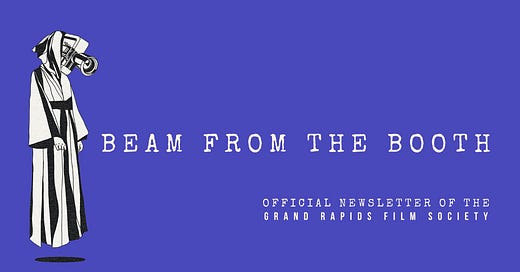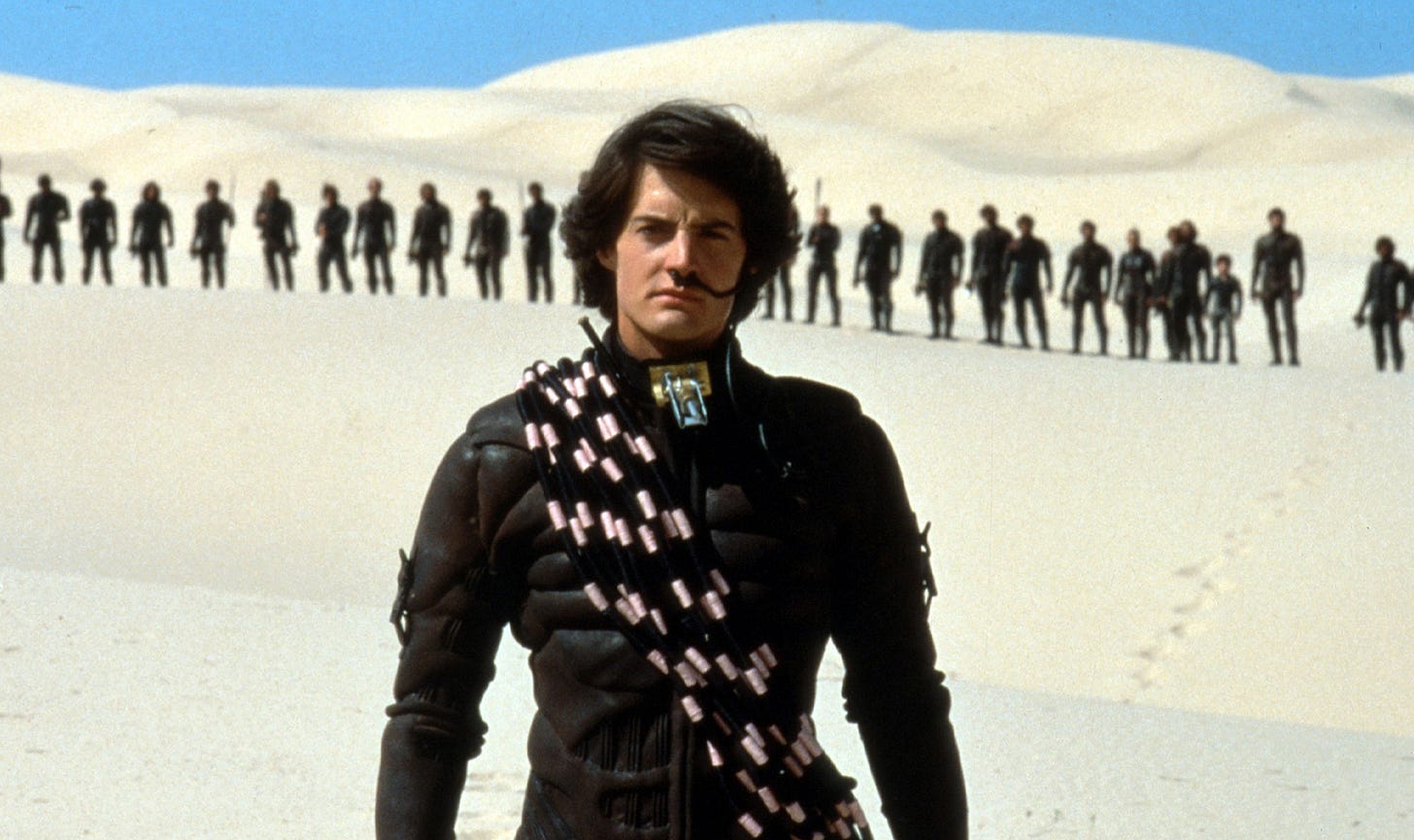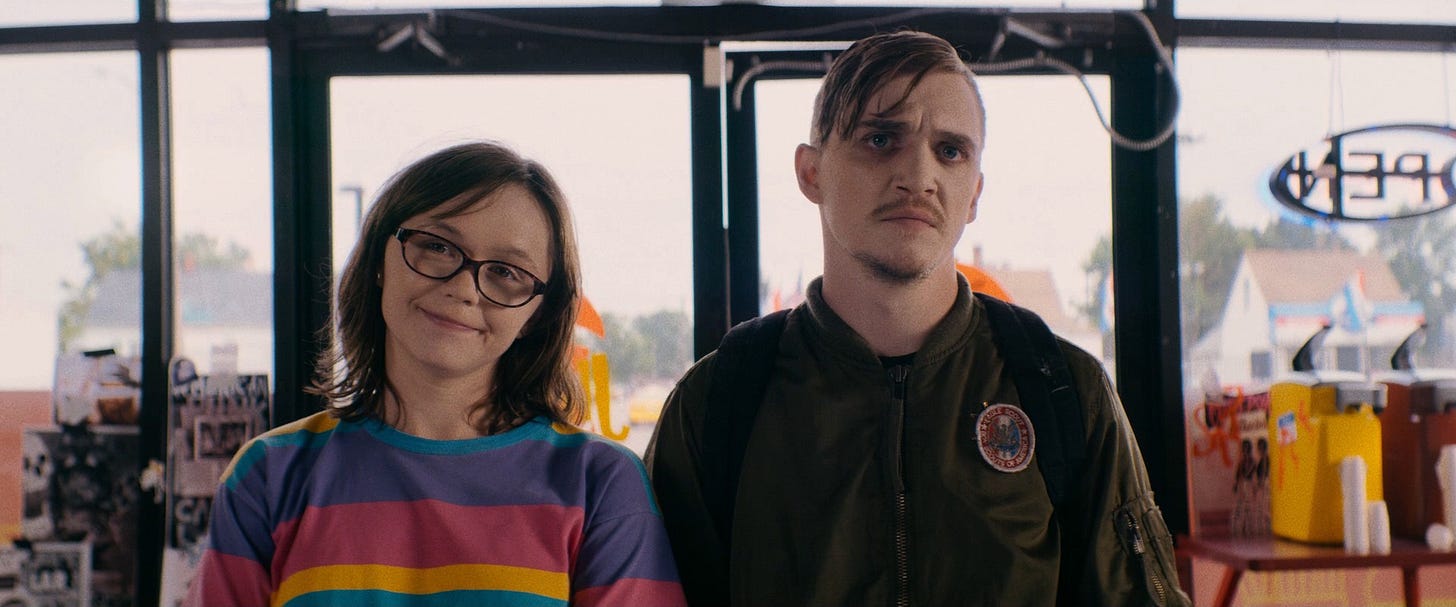[EDITED BY: GRIFFIN SHERIDAN & SPENCER EVERHART]
Hello and welcome back to an all-new installment of BEAM FROM THE BOOTH brought to you by GRAND RAPIDS FILM SOCIETY!
Warmer weather has finally descended upon West Michigan, but will that keep any of us from staying inside and watching movies all day? Only the weak.
(But also, go get some sun. Your brain needs it.)
As we gear up for our May programming — see next issue for more details — we wanted to stop and ponder a bit. Specifically, our own Matt Everitt has taken some time to address the ethical, spiritual, and creative questions that recent advancements in AI technology has brought to the world of cinema.
Please enjoy…
PIXELATING THE SOUL: WHAT TARKOVSKY TEACHES US ABOUT CREATION IN THE AGE OF AI
[WRITTEN AS 8 CHATGPT PROMPTS, ANSWERED BY:
MATTHEW PAUL EVERITT]
PROMPT 1: Pretend you’re Andrei Tarkovsky's biggest fan, prove your bona fides to me.
No filmmaker — let alone artist — means as much to me as Andrei Tarkovsky. When he died at 54, he had only made seven feature films, and each one is truly special to me. I’ve read every possible book I can on his work; his book Sculpting in Time is why I’m the filmmaker I am today. When I played the video game The Witness and found a hidden room where they played a scene from Nostalghia, I instantly DM’d the developer just to chat about Tarkovsky because NO ONE loves Nostalghia like I love Nostalghia (see below).
PROMPT 2: Give the readers a quick recap of the recent Hayao Miyazaki AI trend as a prelude for what’s to come.
A little over a month ago, people discovered ChatGPT could recreate their photos as if a creatively bankrupt Studio Ghibli betrayed everything they’ve stood for and sold to some private equity fund. I hated it.
As far as recent AI trends go, the Miyazaki case makes a little bit of sense. The studio’s films surged in popularity during the pandemic when everyone wanted that sweet, sweet Ghibli filmmaking to help comfort them during quarantine. And rightfully so! Without trying to reduce Miyazaki’s work to simple themes, these are sad movies with bright colors because shit fucking sucks out there, so yeah, who wouldn’t love Totoro and a cat bus to guide them through their mother’s sickness and father’s absence?
But the trend of having a machine recreate your photo in the Ghibli ‘house style’ nearly crashed GPT and revealed something about the people who wasted enough electricity to power small cities: they either don’t understand the movies or they don’t understand how ChatGPT works.
I mean, have you seen Princess Mononoke? If you haven’t, allow Google AI to help you out:
First they came for Hayao Miyazaki, and I did not write anything for Beam from the Booth...because I was not a Miyazaki stan.
Then they came for Andrei Tarkovsky...and I lost my fucking mind.
PROMPT 3 : Concoct an inciting incident that will utterly destroy your soul and radicalize you into writing a nine-part piece for your local film newsletter.
Around 10pm on Thursday, April 3rd, I saw this...
Now look: if you were a tech bro trying to show off what generative AI can do with camera movement, wouldn’t you want to choose a director whose name and work are familiar to the widest audience? So they would have a frame of reference for what’s so remarkable, like ‘what if Hitchcock had a DJI 4D?’; ‘what if Kubrick had a LED wall?’; ‘what if Charlie Chaplin had a drone?’
Nope. They chose Andrei Tarkovsky.
The director who’s often dismissed by new cinephiles because his movies are ‘difficult.’ A Russian dude who only made seven films. A guy who’s pretty hostile towards anyone who doesn’t regard the art of cinema with utter seriousness. The guy who is responsible for hundreds of blank stares when people ask me who my favorite director is.
Before this, I would have sworn the Venn diagram of people who are AI enthusiasts and people who know about Tarkovsky’s films is two circles located on opposite sides of the Earth.
PROMPT 4: Using Tarkovsky’s own words, explain why using AI to add camera movements to his films is an utter bastardization of everything he stood for. Include your sources and add emphasis to the passages you think summarize your argument.
“For Stalker, as a matter of principle, I wanted to avoid distracting or surprising the audience with unexpected changes of scene, with the geography of the action, with elaborate plot — I wanted the whole composition to be simple and muted.”
— Sculpting in Time, pg. 193
“Why do some people only accept as real what is superficial, allegedly ‘beautiful,’ but in fact vulgar, tasteless, inferior, hack? …And is it possible to help such people to experience inspiration and beauty, and the noble impulses that real art touches off in the soul?”
— Sculpting in Time, pg. 178
“I remember pictures by [director Federico Fellini] where the shots, the length of the shots, and their rhythm, were tied to the inner state of the character and the author. But this picture [Roma] has been made with an eye for what is going to please the audience. I find that repugnant. Anyhow, the film tells us nothing new either about Fellini himself or about life.”
— Time Within Time, pg. 405
“...For one reason or another...the general public are fed with appalling ersatz, and no one is concerned about instilling or nurturing taste...People cease to feel any need for the beautiful or the spiritual, and consume films like bottles of Coca-Cola.”
— Sculpting in Time, pg. 179
“How can there then be any question of thinking about ‘pleasing the audience,’ or worrying about giving the public an example to emulate? What audience? The anonymous masses? Robots?”
— Sculpting in Time, pg.172
PROMPT 5: Please explain to the haters and people who think you’re overreacting why this is actually a deeply meaningful personal offense. Use personal anecdotes and an appeal to emotions.
I have such a deep love for Tarkovsky’s films because they present the world, life, and humanity in a way that makes me feel that I’m part of something so much bigger and more beautiful than I’ve ever realized. It feels like levitation.
The medium is his message: the slow rhythm and pacing are the tools he developed over decades to convey his existential confessions about humanity and our place in the universe. And, as a filmmaker, these films are crafted with a precision that can only come from the soul of a single person who dedicated their life to understanding their medium.
His films are the result of his collaborators, his country, his romantic fixations, his depression, his childhood, his superiority complex, his hatred of Beethoven, his love of Kurasawa and Bresson and Bergman. This mix is what makes his films his films.
Stalker is so special precisely because he didn’t add a damn-ass dolly zoom to it.
PROMPT 6: Using every previous prompt, deduce what the root of the issue is.
The anger I feel over AI imagery is an echo of a frustration as old as art itself. Tarkovsky himself was fired up over the low regard for art in society more than forty years ago (see above quotes). This fight over AI is yet another deeply emotional debate about what people consider art and how engaging with art is meant to change us.
If you have a low view of art, you’ll tend to see it as an inessential source of a few endorphins. A little treat. However, if you have a high view of art, then how it’s made and consumed are important parts of the experience and will therefore matter a whole hell of a lot to you.
As you should have guessed by now, I’m one of the high art people.
When I feel a gap between a piece of art and my understanding of it, I think it’s my responsibility to approach the gap and to bridge it to the artist. A huge part of engaging with art, for me (and growing as a person), is asking ‘why would someone create something differently than I would have?’ Those gaps are invitations to expand our perspective, to acknowledge that our point of view will always be limited, and to be grateful that someone has invited us to open ourselves up a little more.
The power of AI makes it much easier than it has ever been to bypass those questions. That power skews user’s judgment easily enough that ‘why did Tarkovsky not move his camera in Stalker?’ becomes ‘I can now add camera movement to Stalker’ that then grows into ‘Tarkovsky should have added camera movement to Stalker, I’ll fix it.’ AI easily removes the soul-expanding questions and reinforces the users pre-existing understanding.
PROMPT 6.5: …but it’s also about stealing.
There’s another source of my anger, and it has to do with using the footage from Stalker without permission. Stalker had a notoriously difficult production, including reshooting nearly the entire film due to a mistake in developing the film. There’s also reason to believe that Tarkovsky’s cancer, which took his life less than ten years later, was a result of exposure to radioactive waste on location.
So to take that footage without providing any compensation for the people who worked so hard to create it, only to shit all over what the man stood for, feels like cartoonish levels of villainy.
PROMPT 7: Okay, but tell me what I can actually do about this.
I’m not going to convince someone that Tarkovsky’s work is too important to be fed to the machines by yelling at them that they’re stealing. I really don’t think they see it as stealing. But maybe — just maybe — there is an interesting conversation to be had about why his films matter so much and why I feel like some things are too special for AI.
Will that technique also work in the comments section? I doubt it.
There is a glimmer of hope, though: I’ve been encouraged by the amount of pushback people get when they share AI images online. At least on my timelines, there are always a few people discouraging the use of AI and explaining why it matters. A local theater chain posted an AI generated image as part of another AI trend, and a large majority of the comments were people criticizing their choice to share AI generated imagery.
PROMPT 8: Sum up your nuanced and well-researched manifesto in one paragraph for the people who jump to the last paragraph of an article to get the Big Idea.
Tarkovsky said “Art is born and takes hold wherever there is a timeless and insatiable longing for the spiritual.” That could be why so many people use AI: to feel creative, to breakthrough their own limited abilities, to feed something inside of their souls. But AI offers the illusion of insight without illuminating anything for the user.
Seeing so many people clamoring for a taste of what it feels like to create something is, in and of itself, a sign that they have a longing for something more. AI is a devil on their shoulder, whispering that they can create something meaningful without the messy, painful, soul-strengthening struggle. My hope is that we can be the angel on the other shoulder — reminding them that their pain, their dreams, their passion, and their struggle are not just obstacles but rather what defines each of us as human. That struggle is precisely where we meet ourselves and come to terms with who we are. To hand that struggle over to AI is to throw in the towel on one of the most definitively human experiences. And if Tarkovsky has taught me anything, it’s that embracing the struggle and sharing it with others might just be the most valuable thing we have to offer each other.
UPCOMING EVENTS
DUNE (Lynch, 1984)
WHAT: Part of THE MAN FROM ANOTHER PLACE: A DAVID LYNCH RETROSPECTIVE. In the year 10191, a royal decree awards the planet Arrakis to Duke Leto Atreides and ousts his bitter enemies, the Harkonnens. However, when the Harkonnens violently seize back their fiefdom, it is up to Leto's son, Paul, to lead the Fremen, the natives of Arrakis, in a battle for control of the planet.
WHEN: Monday, May 12th, 8:00pm
WHERE: The Wealthy Theatre
DINNER IN AMERICA (Rehmeier, 2020)
WHAT: Part of the MAY’D IN MICHIGAN series. An on-the-lam punk rocker and a young woman obsessed with his band unexpectedly fall in love and go on an epic journey together through America's decaying Midwestern suburbs.
WHEN: Monday, May 19th, 8:00pm
WHERE: The Wealthy Theatre
And so we’ve arrived at the end of another BEAM FROM THE BOOTH! We appreciate you taking the time to read it and truly hope you’ll continue to do so. Be sure to SUBSCRIBE to get each issue in your inbox every week, and stay up-to-date on all things GRFS.
Plus, join us on social media! We’d love to chat with everyone and hear YOUR OWN thoughts on everything above (you can also hop in the comments section below).
Know someone you think will dig BEAM FROM THE BOOTH? Send them our way!
Look for ISSUE #99 in your inbox NEXT WEEK!
Until then, friends...













